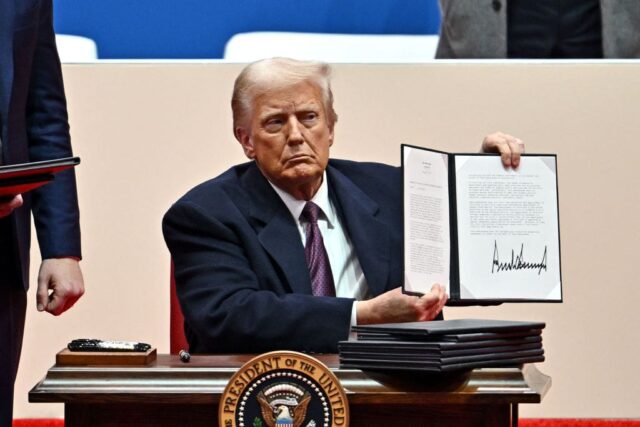
As President Donald Trump concludes his first 100 days in office during his second term, Amnesty International has issued a scathing report that paints a grim picture of human rights in the United States and abroad. In its report titled Chaos & Cruelty: 10 Compounding Assaults on Human Rights, Amnesty outlines the Trump administration’s systematic erosion of democratic norms, aggressive authoritarian tactics, and unprecedented disregard for human rights.
Suppressing Dissent and Fostering Fear
According to Amnesty International, President Trump’s administration has consistently weaponized the government against those who challenge or criticize him. Tactics more commonly associated with authoritarian regimes—such as suppressing dissent, bypassing the rule of law, and attacking the judiciary—have now become standard practice.
Paul O’Brien, Executive Director of Amnesty International USA, stated, “One hundred days into his second term, President Trump has led with cruelty and chaos, creating a human rights emergency that has affected millions of people.”
Attacks on Immigration and Asylum
Among the administration’s most alarming policies are its sweeping crackdowns on immigrants and asylum seekers. These include family separations, deportations under the Alien Enemies Act, and a near-total dismantling of the asylum system—violating international laws and forcing many into precarious, fear-driven existences.
Crackdowns on Free Expression
The Trump administration has also severely undermined the right to protest and freedom of expression. Students protesting in support of Palestinian rights have been detained and threatened with deportation, with non-citizen students particularly vulnerable. One such case is Mahmoud Khalil, a Palestinian student lawfully residing in the U.S., who was detained and placed into deportation proceedings simply for participating in a peaceful protest.
Erosion of Legal Norms and Judicial Independence
Amnesty International warns that Trump’s continued disregard for judicial rulings, threats against judges, and pressure on legal institutions reflect deep erosion of checks and balances. These actions form the foundation of an anti-rights agenda that is authoritarian in nature and dangerous in scope.
Undermining the Free Press
President Trump’s antagonism toward the press has escalated, with lawsuits against media outlets, threats to withdraw funding for global press freedom initiatives, and regulatory crackdowns that compromise the independence of journalism. These measures threaten the foundation of informed public discourse essential to democracy.
Discrimination Against Marginalized Groups
The administration has also launched targeted attacks against women, LGBTQIA+ individuals, and racial minorities. From anti-trans executive orders to attempts to restrict abortion access and eliminate Diversity, Equity, and Inclusion programs, these policies further marginalize vulnerable communities.
Global Human Rights Setbacks
Trump’s human rights violations are not confined to U.S. borders. The administration’s foreign policy shifts have had global repercussions:
- Abrupt cuts to foreign aid programs, threatening international public health, human rights, and peacekeeping efforts.
- Withdrawal from key global organizations like the Human Rights Council, WHO, and Paris Climate Agreement.
- Rolling back civilian harm mitigation measures and military accountability.
- Weakening anti-corruption efforts and empowering unregulated corporate activity.
Tech platforms, emboldened by a lack of accountability, have further enabled authoritarian practices. Trump’s apparent alliance with billionaire Elon Musk has raised eyebrows, especially amid concerns over misuse of sensitive personal data and financial manipulation.
The Bigger Picture: A Global Trend Toward Authoritarianism
Erika Guevara-Rosas, Amnesty International’s Senior Director for Research, Policy, Advocacy and Campaigns, emphasized the global implications: “We are witnessing an alarming escalation of state-sponsored repression and abandonment of human rights norms around the world.”
Amnesty International is calling on civil society, international institutions, and global leaders to resist these authoritarian trends. It urges collective action to defend civic space, uphold international human rights law, and ensure future generations are not led into deeper oppression.
Conclusion
As the Trump administration’s first 100 days in its second term come to a close, the picture painted by Amnesty International is bleak. The cumulative effect of policies enacted and rights violated is nothing short of a human rights emergency. The challenge for the American people—and for the global community—is to confront and reverse these dangerous trends before they become permanently embedded in the national and international order.



